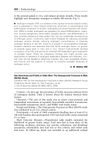 25 citations,
March 2000 in “Journal of Endocrinological Investigation”
25 citations,
March 2000 in “Journal of Endocrinological Investigation” Testosterone therapy aims to treat hormone deficiencies and various conditions safely and effectively, but requires careful patient monitoring due to potential side effects.
 21 citations,
January 2021 in “Therapeutic Advances in Endocrinology and Metabolism”
21 citations,
January 2021 in “Therapeutic Advances in Endocrinology and Metabolism” Testosterone may have a dual role in COVID-19, potentially worsening outcomes in men, and testosterone therapy could help some patients, but more research is needed.
 18 citations,
March 2020 in “Frontiers in Neuroendocrinology”
18 citations,
March 2020 in “Frontiers in Neuroendocrinology” The enzymes 5α-reductase and 3α/β-hydroxysteroid oxidoreductase help create brain-active substances from progesterone and testosterone, which could be used for treatment, but more research is needed to ensure their safety and effectiveness.
 15 citations,
July 2019 in “Journal of Biological Inorganic Chemistry”
15 citations,
July 2019 in “Journal of Biological Inorganic Chemistry” Finasteride helps prevent kidney stones, but side effects need more research.
 12 citations,
September 2018 in “Journal of Drug Delivery Science and Technology”
12 citations,
September 2018 in “Journal of Drug Delivery Science and Technology” The silk fibroin hydrogel with FGF-2-liposome can potentially treat hair loss in mice.
 10 citations,
December 2019 in “in Vivo”
10 citations,
December 2019 in “in Vivo” Testosterone makes the connections in the uterus lining simpler and lowers certain protein levels, which might lead to infertility.
 5 citations,
September 2009 in “Journal of Complementary and Integrative Medicine”
5 citations,
September 2009 in “Journal of Complementary and Integrative Medicine” Citrullus colocynthis fruit extract and its compound may help treat enlarged prostate.
 1 citations,
March 2021 in “The Journal of Sexual Medicine”
1 citations,
March 2021 in “The Journal of Sexual Medicine” The letter suggests testosterone replacement therapy might worsen COVID-19 outcomes.
 June 2022 in “International journal of drug delivery technology”
June 2022 in “International journal of drug delivery technology” Convolvulus arvensis ethanolic extract can potentially promote hair growth and reduce hair loss.
 January 2010 in “Yearbook of Endocrinology”
January 2010 in “Yearbook of Endocrinology” Older men with lower levels of available testosterone are more likely to be frail.
 58 citations,
January 2003 in “Thrombosis and Haemostasis”
58 citations,
January 2003 in “Thrombosis and Haemostasis” Testosterone may slow down wound healing and increase inflammation.
 51 citations,
April 1999 in “The Journal of Steroid Biochemistry and Molecular Biology”
51 citations,
April 1999 in “The Journal of Steroid Biochemistry and Molecular Biology” Testosterone replacement may improve sexual desire and bone health in women with low androgen levels, but more research is needed on its long-term safety.
 29 citations,
March 2021 in “Frontiers in Endocrinology”
29 citations,
March 2021 in “Frontiers in Endocrinology” Testosterone may influence COVID-19 severity and outcomes.
 13 citations,
January 2014 in “PubMed”
13 citations,
January 2014 in “PubMed” Adiantum capillus-veneris Linn reduced hair loss and improved hair growth in mice with testosterone-induced alopecia.
12 citations,
March 2017 in “Arteriosclerosis, thrombosis, and vascular biology” Testosterone helps prevent skin damage in males by acting through both estrogen and androgen pathways.
 9 citations,
August 2000 in “Journal of Periodontal Research”
9 citations,
August 2000 in “Journal of Periodontal Research” Finasteride reduces testosterone conversion, progesterone lessens this, and levamisole enhances finasteride's effect.
 8 citations,
March 2012 in “The Journal of Steroid Biochemistry and Molecular Biology”
8 citations,
March 2012 in “The Journal of Steroid Biochemistry and Molecular Biology” Testosterone and dihydrotestosterone have similar effects on body composition and metabolic health in men.
 6 citations,
September 1998 in “The Journal of The British Menopause Society”
6 citations,
September 1998 in “The Journal of The British Menopause Society” Testosterone replacement may help postmenopausal women with sexual function and bone density, but suitable treatments are limited.
 4 citations,
May 2019 in “Physiology & Behavior”
4 citations,
May 2019 in “Physiology & Behavior” Cocaine impairs male sexual behavior and alters testosterone metabolism in the brain.
 4 citations,
November 2015 in “Journal of Investigative Dermatology”
4 citations,
November 2015 in “Journal of Investigative Dermatology” Testosterone may worsen hair loss by affecting hair growth signals, while different prostaglandins can either hinder or promote hair growth.
 3 citations,
February 2018 in “Human Reproduction”
3 citations,
February 2018 in “Human Reproduction” A man with testotoxicosis was fertile despite low FSH levels, suggesting high testosterone may allow sperm production without FSH.
 2 citations,
January 2023 in “BioMed Research International”
2 citations,
January 2023 in “BioMed Research International” Beetroot extract nanogel may help treat hair loss caused by testosterone.
 October 2023 in “FASEB bioAdvances”
October 2023 in “FASEB bioAdvances” Akkermansia muciniphila may help prevent testosterone-related hair loss.
 July 2023 in “Journal of Microbiology and Biotechnology”
July 2023 in “Journal of Microbiology and Biotechnology” Terminalia bellirica extract may help promote hair growth and prevent hair loss caused by testosterone.
 May 2023 in “Journal of Ethnopharmacology”
May 2023 in “Journal of Ethnopharmacology” The wild garlic plant, Allium macrostemon Bunge, can promote hair growth and could potentially be used to treat hair loss.
 18 citations,
March 2002 in “The journal of investigative dermatology/Journal of investigative dermatology”
18 citations,
March 2002 in “The journal of investigative dermatology/Journal of investigative dermatology” Estrogen increases blood vessel growth factor production, while testosterone blocks this increase.
 196 citations,
May 2001 in “The journal of investigative dermatology/Journal of investigative dermatology”
196 citations,
May 2001 in “The journal of investigative dermatology/Journal of investigative dermatology” Sebocytes play a key role in controlling androgen levels in human skin.
 165 citations,
February 2014 in “Phytotherapy Research”
165 citations,
February 2014 in “Phytotherapy Research” Myrtle has various health benefits and potential for medicine development.
 134 citations,
April 2020 in “Journal of Cosmetic Dermatology”
134 citations,
April 2020 in “Journal of Cosmetic Dermatology” Male pattern hair loss could hint at androgens affecting COVID-19 severity.
 118 citations,
May 2003 in “Toxicological Sciences”
118 citations,
May 2003 in “Toxicological Sciences” Exposure to finasteride in the womb caused lasting reproductive issues in male rats.




























